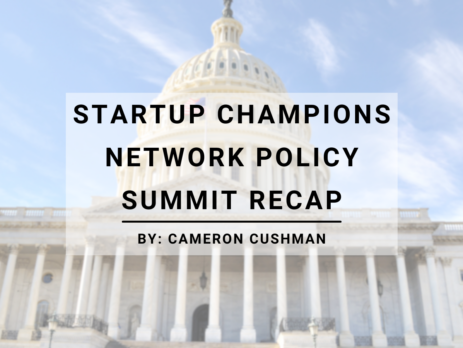Last week, several of us from the HSC Next team attended the first-ever policy-focused summit hosted by the Startup Champions Network (SCN) in Washington, DC. Though the SCN crew has been hosting Summits in locations around the country for more than a decade now, this was the first one they held in our nation’s capital and the first one focused on policy for entrepreneurs, innovators and the organizations that support them. The conversations were encouraging and insightful. Here are a few of my takeaways from DC.

First, we discussed how to build a more entrepreneurial workforce. Traditionally, Federal and state job training programs have not supported or trained people on the skills required to become business owners – instead, they have focused on more traditional, blue-collar training opportunities. Billions of dollars fund these programs yearly, leaving out an important sector of our economy – the dreamers, the doers and the makers. We learned about some efforts to change this, primarily stemming from the Workforce Innovation Opportunity Act (WIOA) that became law in 2014. In January 2024, 40 percent of the state’s plans to implement this act now discuss some form of entrepreneurial training.
Make Startups, an entrepreneurial support organization based in Augusta, Georgia, educated us about some of the work they are doing to encourage more training dollars and programs for entrepreneurial training programs. They distributed this document to prove that workforce systems are legally authorized and required to support startups through the WIOA.
They also recommended utilizing their Workforce Opportunity Calculator to show the impact training entrepreneurs could have on our county. Their results were staggering for Tarrant County.

Second, we learned about the many Federal grant opportunities for building entrepreneurial communities that EDA, NSF, and other Federal agencies are offering. With the recent passage of the CHIPS Act to address ten critical infrastructure areas, the government is actively trying to increase innovation and competitiveness through building startup ecosystems. There was so much discussion about the role that entrepreneurial support organizations should play in building industry clusters. “The whole point of building clusters is to start new businesses,” said Melissa Roberts Chapman from the Federation of American Scientists.
Finally, the team from Right to Start showed us how to meet with local government leaders and legislators effectively. They showed us what to do and what not to do during a role-playing session (featuring yours truly!) and then discussed some effective strategies for telling policymakers about our issues. They gave some concrete advice for anyone looking to engage their government leaders about entrepreneurial ecosystem building:
- Be clear on the goal.
- Research the member ahead of your meeting and understand their background.
- Respect the staff. Sometimes they are the ones you are trying to influence.
- Know your issues and be prepared to answer tough questions.
- Keep it short!
- Never go “off message.”
- Follow up ASAP with any documents, data or research you promised to send.

Overall, the Policy Summit was a great reminder of our role to keep the innovators and entrepreneurs in our communities on the top of policymakers’ minds. Typically, entrepreneurs are too busy building their companies to engage with lawmakers at any level and so ecosystem builders must become advocates for them and the issues they face. They are such a critical part of our economy and we should be doing everything we can to support them to continue bringing new innovations to market, create jobs for people and build wealth for our society.



